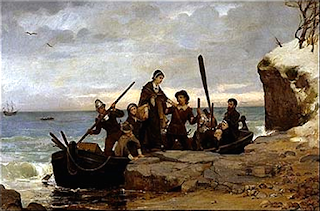 |
| Uh-oh, the refugees are coming! |
So in summary, there is no evidence the medieval mind considered or knew water to be unhealthy. Bad water was a concern, but people had their own guidelines on how to tell good from bad. If you want more evidence, look at how long it took Dr John Snow to persuade people that cholera was spread via water. That was in the 1800s -- more than two centuries after the Mayflower -- and it was also when they realised that drinking beer was safer than well-water.
Plus, boiling the wort for beer before fermentation seems to have come in some time after the introduction of hops (remembering here that in mediaeval times, ale was unhopped, beer was hopped). Boiling modifies the acids in the hops and is needed to fully activate their bitterness and preservative qualities. Before hops, there was no need to boil.
What you did need was hot water for the mash, as it's how you get the fermentable sugars out of the malted grain. This heating would have been enough to kill most bugs, but was not a boil. Apart from anything else, at a time when a fire meant collecting or buying firewood, unnecessary boiling would have been a waste of expensive and/or scarce fuel.
The truth seems to be that drinking water was not fashionable among the middle classes in 1620 -- it was something that only poor people did, and the religious fanatics aboard the Mayflower were not poor people.
See also
ReplyDeletehttp://zythophile.co.uk/2014/03/04/was-water-really-regarded-as-dangerous-to-drink-in-the-middle-ages/
All very interesting but here are two facts:
Delete1) Boiled water is safer than non-boiled.
2) Human pathogens cannot live in beer (either boiled or non-boiled as far as I know).
If people back in the days before safe drinking water and microbiological analysis were not drinking beer as a substitute, they probably should have been.
That's all true and very sensible, but it relies on knowledge that wasn't there in 1620. Although he built on earlier work, Louis Pasteur didn't prove "the germ theory" until the 1860s, for example. And it seems to have been a surprise to John Snow in the 1850s that the monks living near the cholera outbreak were unaffected - because, as it turned out, they drank only beer.
DeleteFrom your link by Lisa Grimm: "Once on land, the new settlers remained suspicious of the local water, given that few (if any) were accustomed to drinking fresh water".
ReplyDeleteWhy would they be suspicious of the local water, if they didn't think it might make them sick? It seems likely that they wanted to stick to beer which they know would not.
Also, I question whether not drinking water was "unfashionable" or just good sense. Today, it is a fashion for many in the middle classes to stop smoking, drink less, eat less red meat, and exercise more. These are all things associated with improving one's health. It doesn't seem a stretch that these "Pilgrims" and others of their class were cognizant of the fact that beer was healthier than water at this time.
There's plenty of evidence that beer was regarded as nutritious and wholesome, and that water was for poor people. The evidence dating back to Roman times is that fresh water was good for you. People knew that "bad' water could make you ill, but not what made it bad, nor that water carried diseases such as cholera.
DeleteAnd they certainly didn't *know* pre-1800 that boiling water made it safe, nor was beer (by which most casual writers mean ale) boiled until some while after the introduction of hops.
The myth is not that people regarded beer as healthier. It's that fresh water was regarded as dangerous, and that they knew beer was safer because it was boiled.
Perhaps some myths will not DIE! because they are not myths after all.
ReplyDeleteYou say, "The myth is not that people regarded beer as healthier. It's that fresh water was regarded as dangerous, and that they knew beer was safer because it was boiled." Yet, from one of your links:
ReplyDelete"Pliny also said that it was Emperor Nero, who ruled at the beginning of the first century, who first used the idea of boiling water to rid it of impurities. It was well accepted that boiled water was healthier, and this became common practice." (Debra Kelly)
True, and perhaps a reminder of how much was lost with the Romans. The Romans of Pliny's time also had underfloor heating and concrete that could set underwater, neither of which was widely known or used in Mediæval Europe.
DeleteAnd yet most put the medieval period as lasting until the 15th century, and you feature the Pilgrims who landed in the New World in the 17th.
DeleteI find your article a bit of a muddle. It seems clear that the Pilgrims landed far north of their intended destination of Virginia because they were low on supplies, especially beer. We know that they didn't like to drink water. We know that they had good cause to be distrustful of it. (And nowadays, because of medical science, we know exactly why). The idea that this is some sort of "fashion" and not based on experience beggars belief. We know now, and they apparently surmised, that drinking beer, which doesn't support human pathogens, was healthier than water.
If you want to prove your that there was a myth surrounding the consumption of fresh water as opposed to beer, then why feature people that clearly didn't want to drink water?